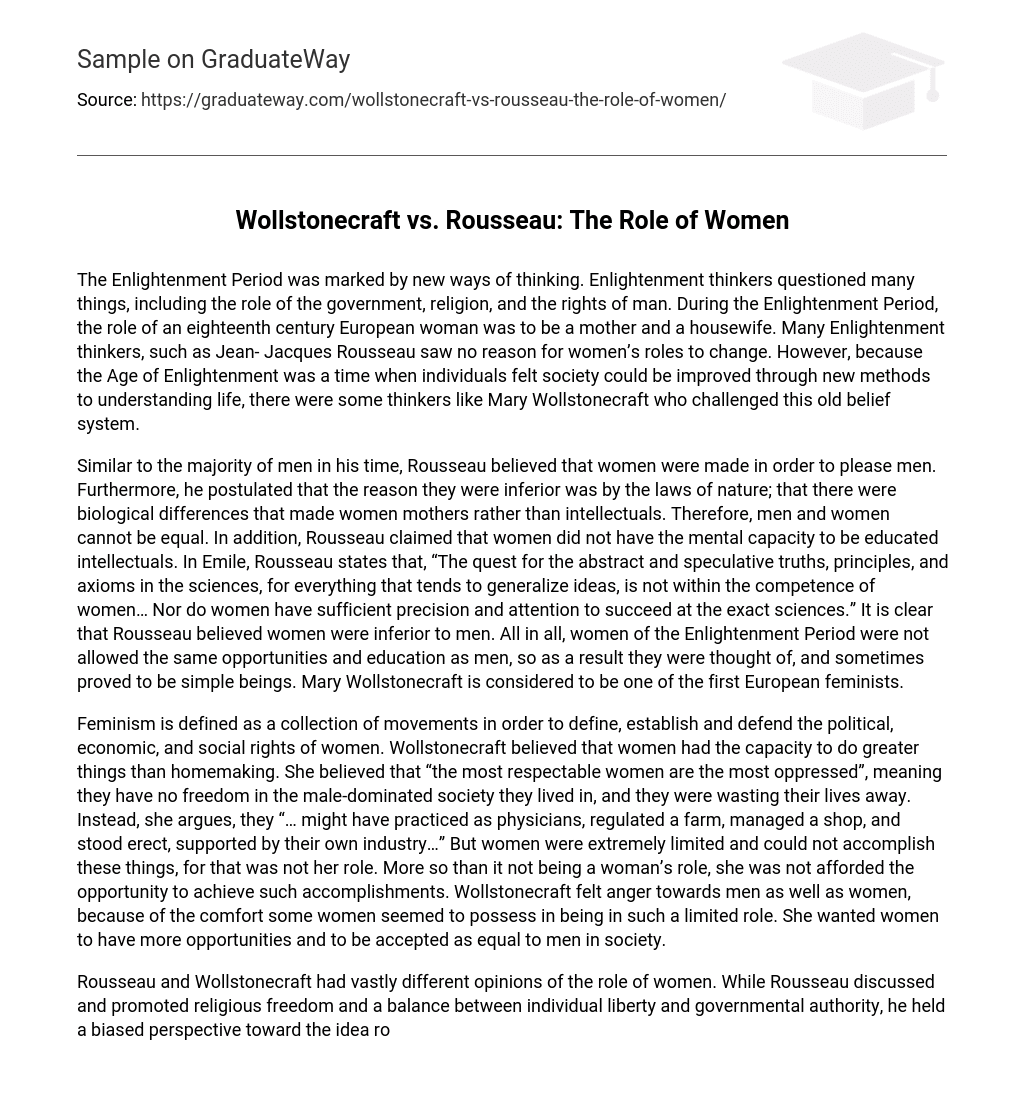The Enlightenment Period was marked by new ways of thinking. Enlightenment thinkers questioned many things, including the role of the government, religion, and the rights of man. During the Enlightenment Period, the role of an eighteenth century European woman was to be a mother and a housewife. Many Enlightenment thinkers, such as Jean- Jacques Rousseau saw no reason for women’s roles to change. However, because the Age of Enlightenment was a time when individuals felt society could be improved through new methods to understanding life, there were some thinkers like Mary Wollstonecraft who challenged this old belief system.
Similar to the majority of men in his time, Rousseau believed that women were made in order to please men. Furthermore, he postulated that the reason they were inferior was by the laws of nature; that there were biological differences that made women mothers rather than intellectuals. Therefore, men and women cannot be equal. In addition, Rousseau claimed that women did not have the mental capacity to be educated intellectuals. In Emile, Rousseau states that, “The quest for the abstract and speculative truths, principles, and axioms in the sciences, for everything that tends to generalize ideas, is not within the competence of women… Nor do women have sufficient precision and attention to succeed at the exact sciences.” It is clear that Rousseau believed women were inferior to men. All in all, women of the Enlightenment Period were not allowed the same opportunities and education as men, so as a result they were thought of, and sometimes proved to be simple beings. Mary Wollstonecraft is considered to be one of the first European feminists.
Feminism is defined as a collection of movements in order to define, establish and defend the political, economic, and social rights of women. Wollstonecraft believed that women had the capacity to do greater things than homemaking. She believed that “the most respectable women are the most oppressed”, meaning they have no freedom in the male-dominated society they lived in, and they were wasting their lives away. Instead, she argues, they “… might have practiced as physicians, regulated a farm, managed a shop, and stood erect, supported by their own industry…” But women were extremely limited and could not accomplish these things, for that was not her role. More so than it not being a woman’s role, she was not afforded the opportunity to achieve such accomplishments. Wollstonecraft felt anger towards men as well as women, because of the comfort some women seemed to possess in being in such a limited role. She wanted women to have more opportunities and to be accepted as equal to men in society.
Rousseau and Wollstonecraft had vastly different opinions of the role of women. While Rousseau discussed and promoted religious freedom and a balance between individual liberty and governmental authority, he held a biased perspective toward the idea role of women. It is ironic because he presented a multitude of new ideas, but in regards to women, he held on to the old belief system. He only thought of women in terms of how they related to men. In contrast, Wollstonecraft believed that women had the potential to be financially and intellectually independent from men. Wollstonecraft wanted women to want more for themselves, other than what Europe’s society expected from them. The role of women was not changed as a result of the Enlightenment period, but in the centuries to come women would challenge their expected roles.





